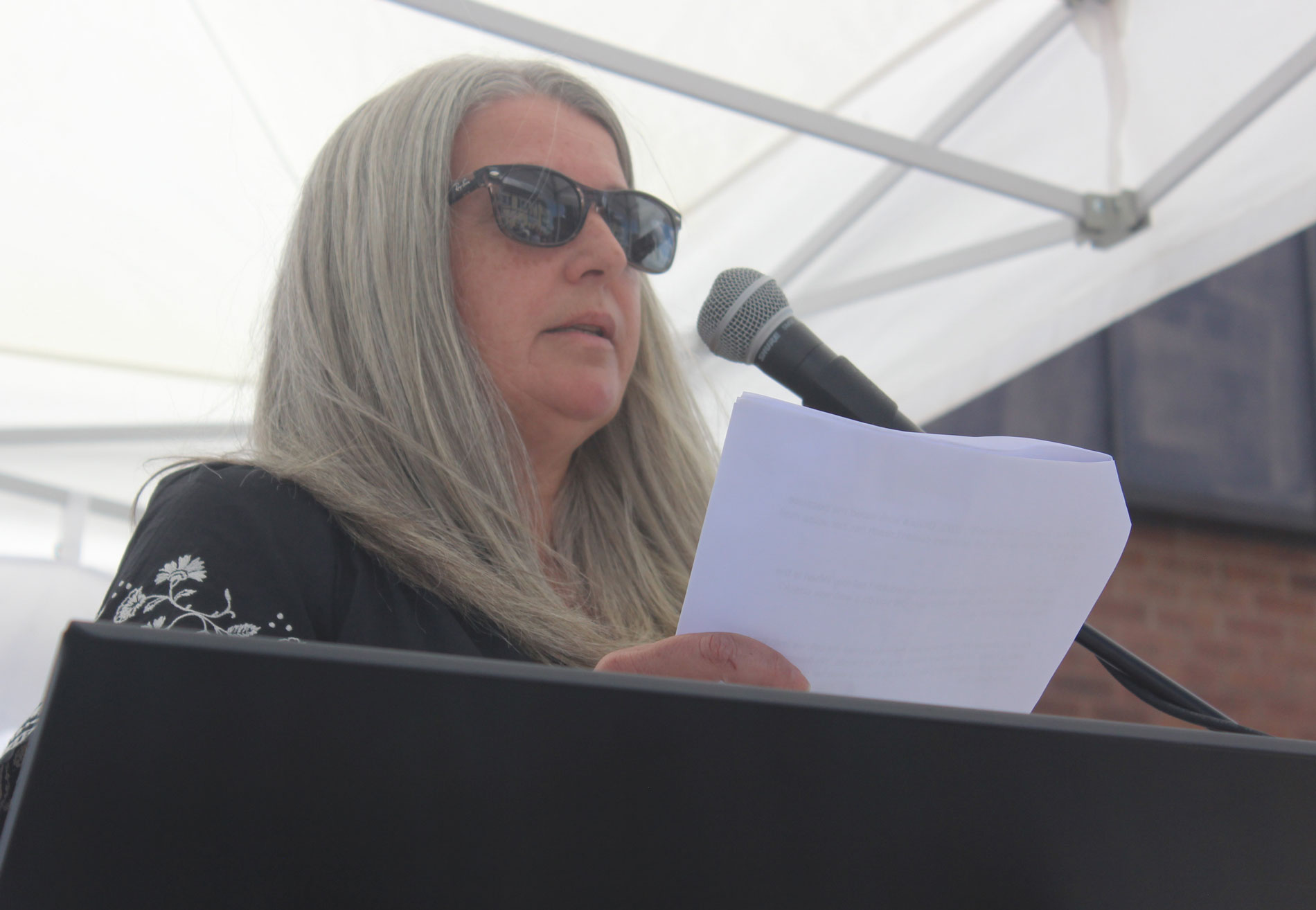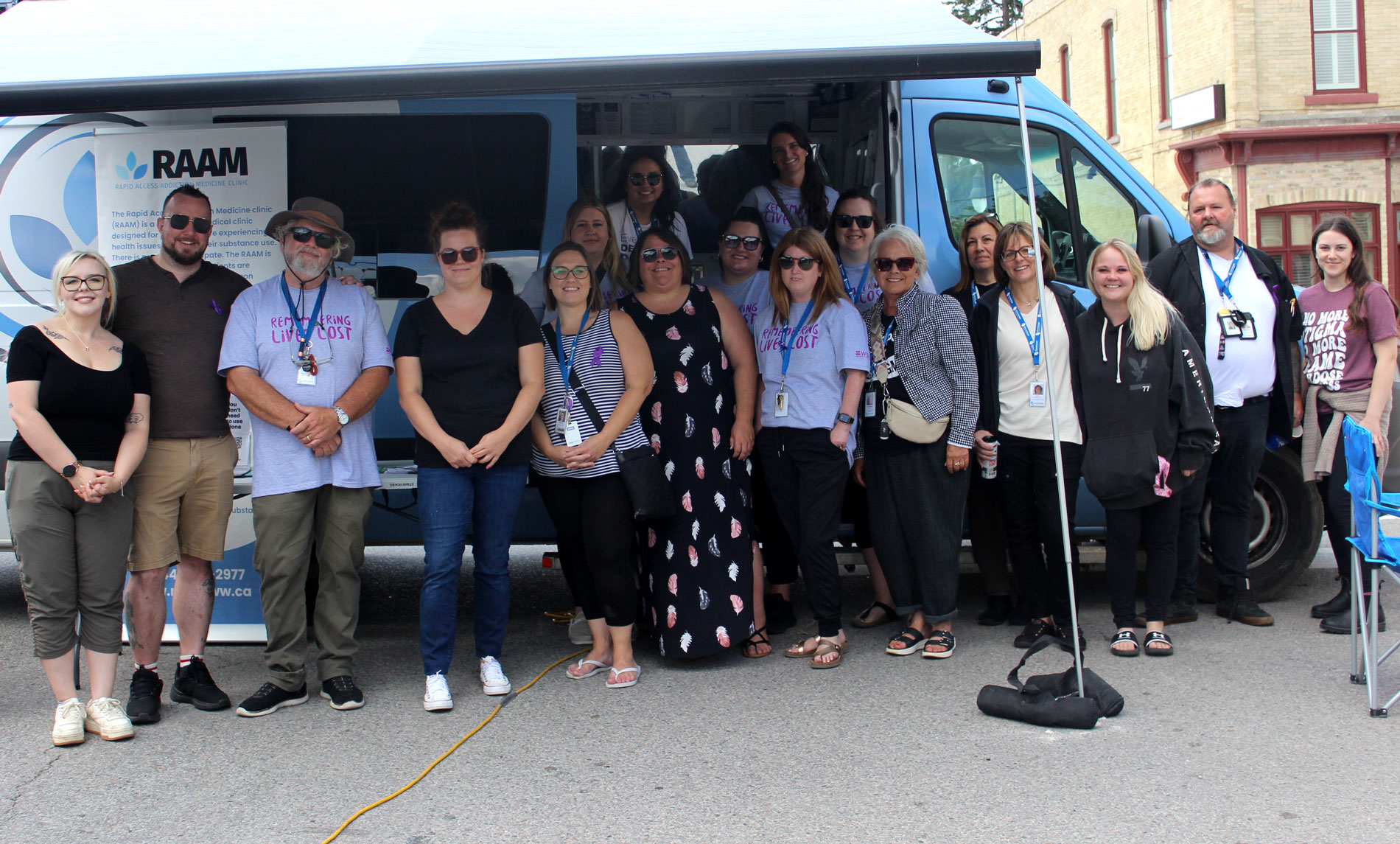MOUNT FOREST – A gathering in Mount Forest on Aug. 22 honoured people who have died of drug poisoning.
Service providers and community members came together to remember lost loved ones and discuss what needs to be done to save lives.
The annual Drug Poisoning Awareness Day (formerly Overdose Awareness Day) event is organized by Wellington Guelph Drug Strategy (WGDS), a coalition of partner agencies and people with lived experience who work to reduce harms around drug use.
The coalition is set to hold a similar event in downtown Guelph on Aug. 29.
International Overdose Awareness Day falls on Aug. 31.
“Drug poisoning deaths have been increasing,” WGDS manager Jean Hopkins told attendees in Mount Forest.
In 2023, at least 62 people in Guelph and Wellington County died due to drug poisoning.
“That’s the highest number seen on record since public health started collecting the data,” said Hopkins.
In Ontario, someone dies of drug poisoning on average once every two and a half hours, she added.
“Those numbers are people we work with … community members, neighbours, friends – people loved and missed,” Hopkins said.
‘Preventable’
“And those losses are preventable,” she added. “Community care prevents these losses. Harm reduction services prevent these losses. Barrier free services prevent these losses.”
At the supervised consumption site in Guelph, 198 drug overdoses were reversed between March 2020 and May 2024, according to Statistics Canada.
Country-wide, there have been 58,444 overdose reversals at supervised consumption sites in the same time period. Statistics Canada notes there were no fatal overdoses at the sites in those four years.
A supervised consumption site, or consumption and treatment services (CTS) site, is a place people bring their own drugs to use in the presence of trained staff.
These staff also connect people with resources including addiction treatment, healthcare and social supports, provide wound care and health education, and offer harm reduction services such as needle exchange, drug testing and naloxone kits.
On Aug. 20, the provincial government announced that 10 of the province’s 23 safe consumption sites will need to shut down by March 31, because of their proximity to schools or daycares.
This includes the Guelph site, where many Wellington County residents access services.
Legal clinic rural support worker Maddy Smith spoke with the Advertiser about a misconception that drug poisoning is a “city problem,” or a problem that people moving from cities bring to rural communities.
“But it’s our loved ones, and people that have been here a long time,” that are impacted by the drug poisoning crisis, she said.
One of these local families is Jacinta Cassidy’s.

Jacinta Cassidy is the manager of programs at Guelph Wellington Women in Crisis, but said she attended the event as a “grieving mother.” She told attendees about the life and death of her daughter, Olivia Gillen, and urged the community to demand access to better resources and support.
Olivia Gillen
Cassidy is the manager of programs at Guelph Wellington Women in Crisis, and she spoke to attendees at the event about the death of her daughter, Olivia Gillen.
Cassidy described the gleam in Gillen’s eye and the skip in her step, and how she made friends everywhere she went.
Gillen was raised in Fergus, and when she graduated from Centre Wellington District High School, she won a Christian leadership award in recognition of her advocacy for others, Cassidy said.

OLIVIA GILLEN
At 23, Gillen moved to B.C. to pursue her career in tourism and to perform at concerts, fairs and festivals, where she sang and played guitar.
Four years later, on Dec. 5, 2022, Gillen died, but it wasn’t until the spring of 2023 that Cassidy learned what caused her death.
She got a call from the coroner, who, with patience and compassion, explained what happened to her daughter.
In Gillen’s system, the coroner found a therapeutic amount of anti-anxiety medication, prescribed by Gillen’s doctor, who she’d seen just days before, as well as “a small amount of cocaine, and a dust-sized speck of carfentanil,” Cassidy said.
Carfentanil is a synthetic opioid that is about 100 times more potent than fentanyl.
“There is no safe amount of recreational drug use when something the size of a speck of dust … can kill you,” Cassidy said.
“My daughter made a mistake and was … poisoned.”
Cassidy keeps a blog called Adventures in Healing that helps her “hold my head up high despite stigma.”
She said it’s important to keep saying the names and telling the stories of people who died of drug poisoning.
“To those who have not experienced it in their family, please remember that you are lucky, not exempt,” she explained.
“As a community, we need to stop judging and start demanding access to better resources and support.
“We need action, not apathy, from government, criminal justice partners, and community.”
To Cassidy, “every death due to overdose is a policy failure.”
Conversations, teamwork
After a moment of silence, people took turns lying down on the road and sidewalk at King Street East, which was closed off for the event, and drawing chalk outlines around each other, something organizers called a “die-in.”
A white rose was placed in each of the chalk outlines.
The outlines represented the “souls of people lost to drug poisoning,” said Mount Forest Family Health Teams’s rural team lead Elsa Mann.

Michelle Tobin is a Wellington-Dufferin-Guelph Public Health nurse who participated in the “die-in” at the Mount Forest Drug Poisoning Awareness Day event on Aug. 22.
Smith said the die-in is a powerful symbol because it starts conversations – people will notice the chalk outlines in the days after the event, spurring important conversations.
Mann noted stigma around substance use, and said it can be “really hard to talk about loss due to drug poisoning.
“It will take a lot more compassion and conversation at every level” to move towards a solution, Mann said, including at home, in workplaces and in all levels of government.
People using drugs as well as people who have lost loved ones to drug poisoning should be part of those conversations, she added.
Drug poisoning is a “complex problem that takes a lot of coordinated effort” to address, with no one-size-fits-all solution, Mann said.
Sometimes there’s a perception that there aren’t many resources in the county, Smith noted, but the presence of so many service providers at the event showed otherwise.
These organizations included Sanguen Community Health, Portage, the Legal Clinic of Guelph and Wellington County, the Community Resource Centre of North and Centre Wellington, Guelph Wellington Women in Crisis, Homewood Health Centre, Wellington-Dufferin-Guelph Public Health and various family health teams.
Mann said that’s the most service providers to attend the annual event, which she called a “testament to how much we want change.”
Harm reduction
Sanguen nurse Lachlyn Habermehl and community health van peer worker Steph Beaumont spoke with the Advertiser about the importance of harm-reduction services, including naloxone, drug testing and supervised consumption sites.
The Canadian Mental Health Association defines harm reduction as “an evidence based, client-centred approach that seeks to reduce the health and social harms associated with addiction and substance use, without necessarily requiring people who use substances from abstaining or stopping.”
“The reality is, the drug supply is toxic and unpredictable,” Habermehl said. Fentanyl was found in a local crystal meth sample this week, Baeumont added.
Sanguen operates a CTS site in Kitchener, and Habermehl’s eyes welled with tears while discussing the provincial announcement about closures.

Service providers and community members came together for an annual Drug Poisoning Awareness Day event in Mount Forest at King Street East and Highway 6 on Aug. 22.
She said she cried when she first heard the news, too. “It’s devastating,” she said. “There’s no words for it.
“These resources are essential to people,” she said, “especially because a lot of other resources … require you to be abstinent.
“We can’t force somebody to not use drugs.”
“When abstinence is the only route to services, people die,” Beaumont said.
“Everybody has different needs,” Habermehl noted, and the consumption sites provide places where people feel accepted and can be themselves while accessing important resources, including treatment.”
“A space where you can feel emotions, no matter what that looks like, and be treated with kindness and respect,” Baeumont added.
Habermehl is concerned that without supervised consumption sites, people will use drugs in isolated places, increasing risk.
“It doesn’t make sense why CTS are being taken away when so much research shows that harm reduction saves lives and is also cost effective,” she said.
Habermehl encourages anyone with questions or concerns about consumption sites or harm reduction to call Sanguen at 519-603-0223, where staff are “happy to speak with people about their concerns.”
Hope
Siv Thiya is a former resident at Portage, a drug addiction rehabilitation centre for youth in Elora, who said it’s important to keep holding events like this one, because they give people hope.
“In addiction there is a lot of hopelessness,” said Thiya, who felt very alone while experiencing addiction.
He noted an event like Drug Poisoning Awareness Day would have made him feel encouraged, motivated and supported.
Now, Thiya works at Portage to support youths receiving treatment there and does community outreach.
“I love life right now – it’s all new,” he said. “Before, I felt like all I enjoyed was doing drugs.
“Now, I enjoy being at these events, meeting people, talking to people, doing new things.”



